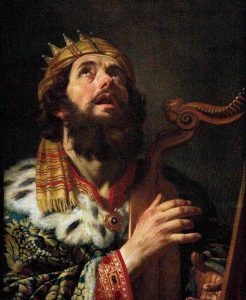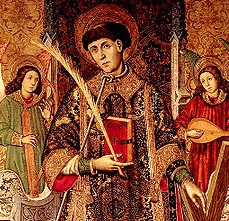WEEK 02 02
Covenants of Hope and Love
Optional Memorial: St Vincent of Saragossa
(Heb 6:10-20; Ps 111; Mk 2:23-28)
************************************************
“God is ever mindful of his covenant.”
That sentence from today’s psalm, along with the two disparate readings (the first reading and the gospel are not as connected as usual), combine to invite us to be a people in a covenant relationship with God filled with hope and centered on the law of love.
God has from the very beginning desired to have an intimate covenant relationship with God’s people. The first covenant was with a couple, Adam and Eve. To them God promised that a woman would bear a child who would overcome the snake. The next covenant was with a family – Noah was ordered to take his whole family into the ark as the world was cleansed. Then God made a covenant with a tribe – ordering Abraham to take his whole tribe and set out on a journey of faith, not even knowing where he was going to, which is why we call him our father in faith. The first reading describes that covenant as a promise to Abraham guaranteed by an oath.
After that, God made a covenant with a nation – the people of Israel at Mt. Sinai through Moses and the 10 commandments. They were to be icons of God here on earth, drawing all the other nations to God. That, we know, they always failed to do, consistently falling for the false gods of possessions, prestige and power.
Then God made a different covenant with David. God swore to him that God would be faithful to him no matter what he did. And David did fall short, acting out of lust, then arranging a murder to cover up his adultery. However, when confronted by the prophet Nathan, David admitted his guilt, repented, and experienced God’s unconditional love through forgiveness of his sins. That transformed David into the only true king Israel ever had.

King David
That is why Jesus is always referred to as Son of David, of the house and line of David, born in the city of David. He is never referred to as Son of Moses, Elijah or any other prophet. And in today’s gospel, Jesus speaks about a time when David actually broke the priestly temple rules, just as Jesus would often break the Sabbath to heal.
David did what he did because he knew he was truly loved by God, and had been given kingly energy by God. Entering the temple and eating the Bread of Presence was a prophetic gesture demonstrating that he was acting in the name of God, who had made him king. He was proclaiming if God was there at that moment, that is what God would have done – so secure was he in the Father’s love. In that way, David is a prefiguring of Jesus, the true king of Israel, and the final covenant of God’s love for us through the sacrificial love of Jesus for us on the cross.
The first reading mentions this covenant is a source of hope, a steadfast anchor to the soul. Pierre Olivier Trembley OMI, recently named a bishop, states the youth he encountered in his ministry at a university lack hope. They lack hope because they don’t have an infinite horizon, a mega-narrative a bigger picture provided by faith into which they can place the events of their so often confused lives. All they are left with is today, and if something negative happens, like a break up of a relationship, they despair and some even take their own lives.
Something as simple as the old catechism question, “Why did God make us?” and it’s answer, “To know, love and serve God in this life, and to be eternally happy with him in the next” provides us with that infinite horizon. It is like the woman who asked, in her will, to be buried with a fork in her hand because her mother always told her, “Keep your fork – the best is yet to come.” When we know the best is yet to come, that our final home is not in this life, we can put up with failure, disappointments and frustration, because we are living in hope undergirded with faith.
The psalm also serves to strengthen our hope in this covenant love of God who is gracious, merciful, always mindful of his covenant forever. Our response is to be grateful praise and hope. Even today’s Gospel Acclamation picks up that theme: “See how great is the hope to which we have been called.”
In the gospel, we see tension between the Pharisees and Jesus centered around keeping the Sabbath law. They were scandalized at the casual attitude taken by Jesus and his disciples towards not working on the Sabbath.
The Word Among Us offers some insightful thoughts on this matter. Like rules for a young child, the sabbath guidelines that Jesus talks about in today’s gospel were meant to help God’s people make a habit of choosing God’s ways. They were meant to instill the practice of prayer and rest into the rhythm of life. Obeying the law in itself wasn’t the goal. Staying close to God was the goal – loving God and giving God time and space in their lives. This is just as true for us as it was for ancient Israel. God did not create us to slavishly observe sabbath law. He created the Sabbath to help us grow into mature believers who live to worship God and follow God’s law of love.
Today’s optional memorial is for St. Vincent, an example for us of someone who understood covenant love and hope. The first Spanish martyr, Vincent was a deacon in Saragossa, Spain, in the 3rdcentury. Deacons were responsible for the local church’s works of charity and mercy – most often the only form of organized relief in those days – and preaching was often part of this work. Vincent excelled in his duties and became known to hostile Roman authorities. He was arrested with his bishop, tortured, imprisoned and killed in 304. He is patron of wine producers, sailors and brick makers.

St Vincent of Saragossa
The Eucharist is a share in that covenant love of Jesus, and truly an act of praise to our God for God’s love made known to us by his Son.
May our celebration empower us to develop an even deeper covenant relationship with Jesus, and empower us to express that covenant through lives of hope and loving service like St. Vincent.




Well thanks for sharing the following homilies and stories about building a deeper covenant relationship with Jesus . If we trust and believe in Jesus he will teach us the meaning having hope and love by keeping the sabbath law. How should we build the covenant with Jesus ; just like the Old Testament Abraham and Noah taking their tribe to a particular placeto establish this family and community. So we are to the same iby spreading out the Good News and proclaiming the gospel because Jesus told us to do. When we become part of God we are to be servants of God and his missionary disciples to evangelize across the country. He created us to praise and worship him with love and compassion by giving our full faith to him. Jesus already showed his unconditional love and mercy when he died on the cross for us and his resurrection . It is like the Ark of the Covenant in Noah’s Ark. Amen. Praise to you Lord Jesus Christ.
Yes, thanks for the detailed teachings and words describing this one true God ; how he remains this God and his also a Trinitarian God. We should be covenant of Jesus Christ. I do not need to go to Sunday school or any religious classes looking at your homilies. You have so much gifts. Bishop Sylvain Lavoie.
I wish I learnt all this during my childhood years in school. I wish more people can understand about this God in this world. We so lucky to have you in our lives .. Many Blessings!